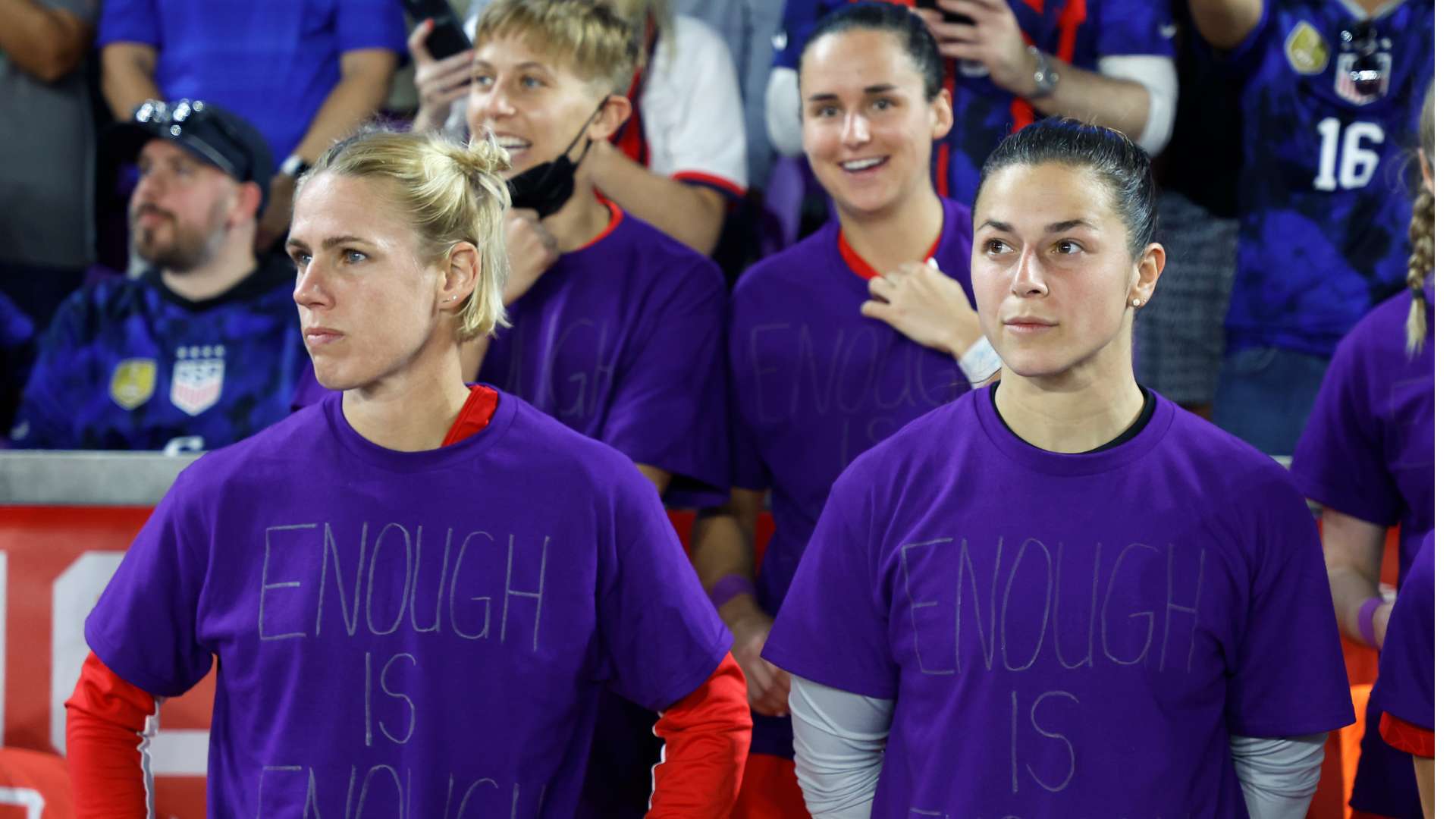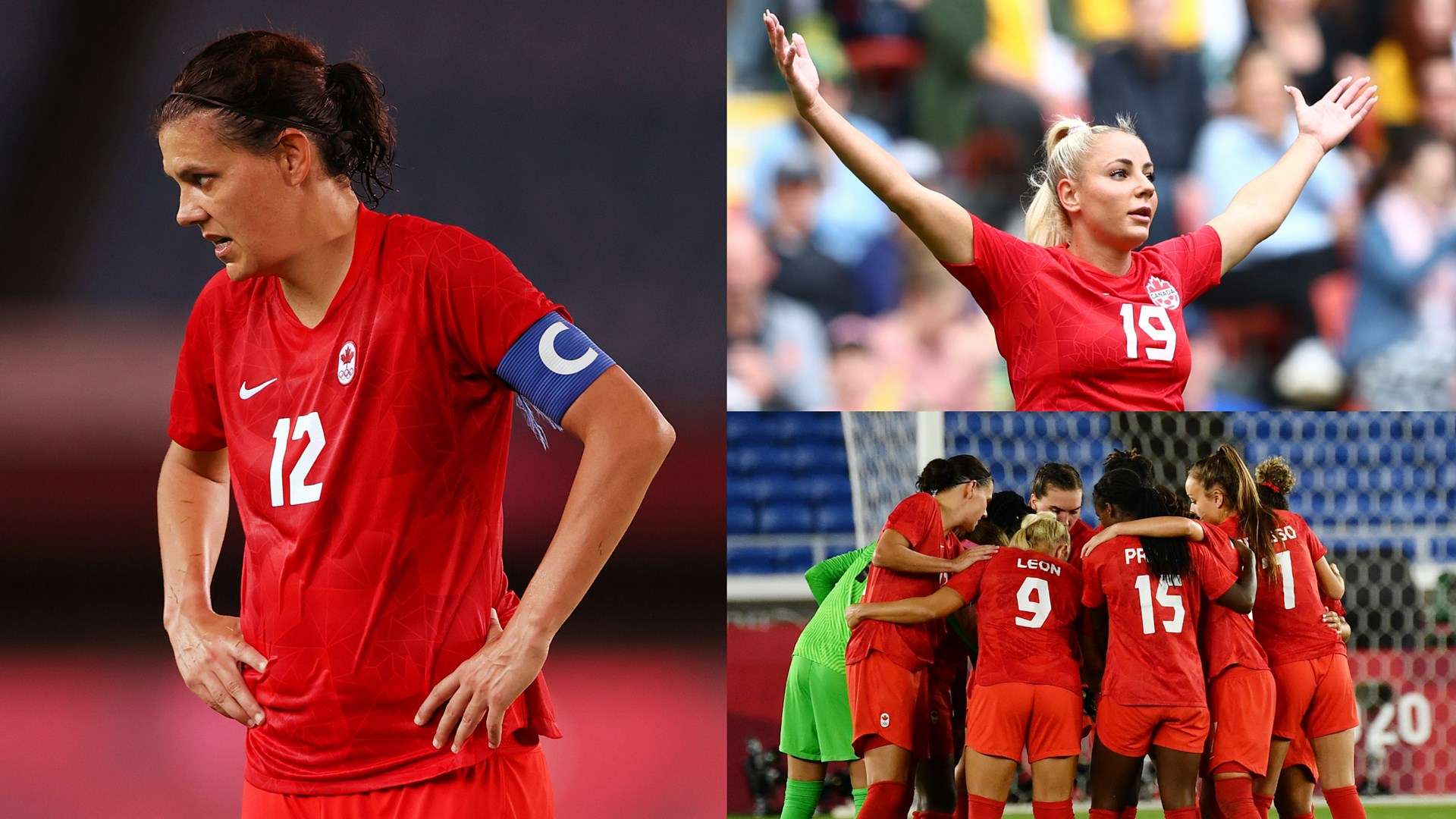It's a Women's World Cup year and, yet, there is a serious dispute going on between Canada's women's national team - the reigning Olympic champions - and Canada Soccer. Both the women’s and men’s national teams issued statements in February expressing their concerns and frustrations as it was revealed that Canada Soccer would be making "significant cuts" to national team programs in 2023.
Plenty has unfolded since. Christine Sinclair, captain of the women’s team, said the players would be going on strike before the SheBelieves Cup. Then, Canada Soccer responded by threatening to sue the players if they did not play in the tournament.
It’s an incredible situation which appears far from resolved. GOAL has everything you need to know about the pay feud between Canada Soccer and its national team players.
Why did Canada announce a strike before the SheBelieves Cup?
On February 10, Canada’s women’s national team released a statement which said that the players were “both outraged and deeply concerned with the news of significant cuts to the national team programs for 2023”.
“Despite our strong track record of success and history-making achievements for more than a decade, we continue to be told there is not enough money to adequately fund our program and our youth teams" it read.
“With the men's national team's recent success, soccer in Canada has never been more popular. Canada’s national teams have never been more successful, or attracting more corporate dollars. Yet despite these steps forward, we are still stuck asking the same question... Where is the funding?
“We have been patiently negotiating with Canada Soccer for more than a year. Now that our World Cup is approaching, the women’s national team players are being told to prepare to perform at a world-class level without the same level of support that was received by the men's national team in 2022, and with significant cuts to our program - to simply make do with less."
The statement explained that the team has had to “cut not only training camp days but full camp windows, cut the number of players and staff invited into camps, significantly limit the already limited youth teams’ activities, all while we continue to face immense uncertainty about compensation”.
“We have been told that there will be no home game for our team before the World Cup. We have been told, quite literally, that Canada Soccer cannot adequately fund the women’s national team, and they have waited to tell us this until now, when we are less than six months from the World Cup.”
Shortly after this was released, the men’s national team issued its own statement, supporting the women’s side.
“The Canadian men's national soccer team players are, once again, deeply disappointed by the actions of Canada Soccer, and wholeheartedly support the women’s national team players’ statement made this afternoon about completely unsatisfactory preparation conditions for this summer's Women’s World Cup,” it read.
“How Canada Soccer is allocating or using funds is unclear and cloaked in secrecy.”
Subsequently, Sinclair told TSN: “As a team, we’ve decided to take job action and from this moment on will not be participating in any Canadian Soccer Association activities until this is resolved.”
Why did Canada Soccer threaten to sue its players?
The following day, on February 11, Canada Soccer and its legal counsel met with the women's national team to continue discussions.
"We want to get this resolved, for both of our national teams, and for soccer in Canada," it said in a statement.
Soon enough, reports emerged that the federation had threatened to sue the Canadian Soccer Players' Association and the players who were attending a team camp in Florida if they didn’t participate in the SheBelieves Cup. This was confirmed in a statement from the players later that day.
"Representatives of the Players’ Association met with Canada Soccer this afternoon for an hours-long meeting in which the concerns of the players were discussed in detail. Prior to that meeting, Canada Soccer told us that they consider our job action to be an unlawful strike,” it read.
Why did Canada's players change course on SheBelieves Cup?
The Canada Soccer lawsuit threat forced their hand.
“They told us that if we did not return to work - and did not commit today to playing in Thursday's game against the United States - they would not only take legal action to force us back to the pitch but would consider taking steps to collect what could be millions of dollars in damages from our Players’ Association and from each of the individual players currently in camp," wrote the Players' Association in a statement.
“As individual players who have received no compensation yet for any of our work for Canada Soccer in 2022, we cannot afford the risks that personal action against us by Canada Soccer will create. Because of this, we have advised Canada Soccer that we will return to training tomorrow and will play in the SheBelieves Cup as scheduled.
“We continue to believe that Canada Soccer’s cuts to the national team programs - especially right before our World Cup - are unacceptable. We continue to believe that Canada Soccer needs to do more to support our programs and our players. And we continue to believe that unless we stand up together and demand more, nothing will ever change.”
“To be clear. We are being forced back to work for the short term,” captain Sinclair said. “This is not over. We will continue to fight for everything we deserve and we will win. The She Believes is being played in protest.”
Did Canada play at the SheBelieves Cup?
Canada did play at the SheBelieves Cup after retracting the strike action due to Canada Soccer’s threats to sue. However, as Sinclair alluded to, there was always going to be some form of protest on show in the tournament.
“The Canadian women’s national soccer team trained for about two hours today. Players either wore their Team Canada kits inside out or taped over the Soccer Canada crest,” Rich Westhead, a journalist at TSN, said on February 12.
That is something the U.S. women’s national team players did back in 2020 ahead of a game when fighting for equal pay.
 Getty
GettyWhich USWNT players have shown support for Canada?
The show of unity between the two teams was no surprise as, when the news emerged of this feud between Canada Soccer and its players, several USWNT stars took to social media to show their support for their fellow pros.
"What do they have to do, win a gold medal? Sell out stadiums? Oh wait...” tweeted striker Alex Morgan. “It's 2023, wake up Canada Soccer you're on the clock.”
“Treat your world-class players as world class,” said captain Becky Sauerbrunn, while Megan Rapinoe took to Instagram to say: "Let us know how we can be supportive.”
The USWNT Players Association also expressed its support, writing: “In solidarity, we stand with our fellow players to the North.”
Other nations have shown support, too. As the U.S. and Canada did when playing each other a few days earlier, the England women's national team wore purple wristbands during its game against Italy in February to display support for gender equality and in a show of solidarity for the Canadian players, just a few days after those
Japan also wore the purple wristbands in its game against the USWNT in the SheBelieves Cup, as did the Republic of Ireland in a friendly against China and Australia in a game against Jamaica.
Has there been any change at Canada Soccer?
On February 27, amid this ongoing dispute and following a letter from provincial and territorial soccer leaders requesting him to do so, Nick Bontis, the president of Canada Soccer, announced his resignation, noting that "this moment requires change".
The change in leadership is something that both the men's and women's national team players had also called for earlier in the month.
"I want to thank the entire membership, our players, our sponsors and every Canadian soccer fan who continues to support the growth of soccer in our country," Bontis said.
"Canada Soccer and both of our National Team Programs have the real potential to sign a historic collective bargaining agreement. Once signed, it will be a landmark deal that will set our nation apart from virtually every other FIFA Member Association.
"While I have been one of the biggest proponents of equalizing the competitive performance environment for our women’s national team, I will unfortunately not be leading this organization when it happens. I acknowledge that this moment requires change."
On May 6, Charmaine Crooks was elected as Canada Soccer's next president. Crooks, the first female to assume the role, will finish out the four-year term of Bontis before another election is held in 2024.
Has anything changed with the funding?
A few days after Bontis' resignation, on March 2, Canada Soccer announced that it had agreed a deal in principle with the women's national team players on an interim funding agreements for 2022. General Secretary Earl Cochrane confirmed the news but added more work still needs to be done.
"Canada Soccer has announced that a deal in principle has been reached with the Women's National Team Players on an interim funding agreement for 2022," said Cochrane.
"We have been consistent and public about the need to have fairness and equal pay be pillars of any new agreements with our players, and we are delivering on that today. While this is an important step forward, and it signals progress, there is still more work to do to ensure both of our national programs are given the necessary resources and supports to prepare and compete.”
Negotiations are continuing over a final collective bargaining deal for both the men's and the women's teams.
What does this mean for Canada before the 2023 Women's World Cup?
One big concern the Canada women’s national team has emphasised in its statements has been about the quality of preparation it will have for this summer’s Women’s World Cup.
Canada won Olympic gold in 2021 and expectations are, therefore, high for this year’s big event as it aims to improve on its best-ever finish of fourth place, which came back in 2003.
This is one of the most talented generations – if not the most talented generation – of players that the country has produced and it has the opportunity to achieve more great things.
As Sinclair said, "this is not over." There will be plenty more to come as the team fights for better conditions and funding.
